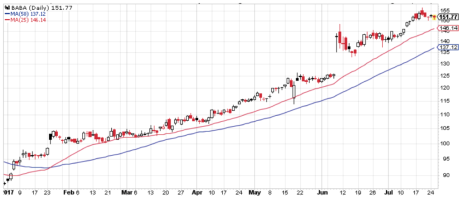This is the third in my series of the five best emerging market stocks, all of which present excellent opportunities for growth investors. (To read my first two installments, click here and here.) And in a shameless bid to interest home-focused U.S. investors, I contrast each one with a well-known U.S. company.
Like Amazon (AMZN)? Consider Alibaba (BABA)
Amazon (AMZN) is a company that doesn’t really need much introduction, since it’s an online colossus with a market cap of almost $500 billion and annual sales of $143 billion. The company sells just about everything (71% of revenue comes from electronics and general merchandise) and is a leader in cloud services and media (both original and purchased). About 60% of revenue comes from North America, and international sources kick in the rest. Founder/guru Jeff Bezos has pushed the company relentlessly into new fields, sometimes frustrating investors by his willingness to forego profits to build infrastructure or gain market share. All in all, it’s an impressive and hugely successful business.
[text_ad]
Amazon has been in business since its incorporation in 1994, but it first made its mark in Cabot Top Ten Trader—which is equivalent of the Good Housekeeping Seal of Approval for a growth stock—in 2002. In the analysis on AMZN, Cabot analyst Tim Lutts noted that the stock had finally recovered from its disastrous drop to 2.5 after peaking at 113 in late 1999, and that investors might want to wait for a pullback from its current price at 22.
Amazon stock has been strong enough to earn a place in Cabot Top Ten Trader 30 times over the years, with the latest appearance coming in May 2016 when it was trading at 684. That makes it a true Top Ten All-Star.
Why BABA is One of the Best Emerging Market Stocks
Alibaba (BABA) resembles Amazon in its scope (market cap is $384 billion) and ambition, but its core business is actually closer to that of eBay. Alibaba runs websites that provide a marketplace where manufacturers and merchants can offer their wares to the public. Alibaba has been diversifying far from its online marketplace roots, but its e-commerce websites, especially Taobao Marketplace and Tmall, are still the biggest contributors to revenue, both from the small commissions taken on each transaction and advertising aimed at visitors. The company is also using its enormous cash flow to finance takeovers of competitors, joint ventures, original content production and a move into cloud services. A comprehensive list of the company’s enterprises and business lines runs to three pages.
Alibaba makes headlines every year when the one-day shopping spree called Singles Day sweeps across China, generating the largest one-day merchandise sales figures of any company on earth. Like much else at Alibaba, the growth of Singles Day has been the work of founder Jack Ma, a Bezos-style visionary who has guided the company since its foundation in 1999.
Alibaba has been a very profitable company, growing revenue by 47% in the fiscal year that ended in March. The company’s latest quarterly report showed a 50% gain in revenue and a 37% jump in earnings, with a 29.1% after tax profit margin (which is down from a 43.5% margin in the previous quarter. Analysts are calling for earnings growth of 33% in both fiscal 2018 and 2019.
The company’s fundamentals are also admirable, with 68% revenue growth in the fiscal year that ended in February 2017. The latest quarterly report featured 81% revenue growth and 104% growth in earnings per share. And analysts are calling for earnings growth of 24% this year and 52% next year.
Alibaba took a long time—31 months in fact—to finally regain the 120 level that it reached after its infamous 2014 IPO. The extreme hype surrounding the stock’s initial public offering drew in a ton of investors at high prices, and they took a long time to get over the depth of the stock’s post-IPO dive. BABA traded down to as low as 57 less than a year after its peak, and hit several powerful corrections on the way to its current high at 152. But once investors jumped on board, the stock was a powerhouse; its momentum is well illustrated by this year-to-date chart.
From the beginning of 2017, AMZN has advanced an admirable 41%, which is a handsome return for any growth portfolio. But BABA is up 83%, which is the kind of performance that can put a growth portfolio well into the green for the year.
If you like AMZN, I’d say there are plenty of good reasons to add a little BABA to your portfolio. It’s one of the best emerging market stocks today - the kind of stock that subscribers to Cabot Global Stocks Explorer have been discovering for well over a decade.
[author_ad]

